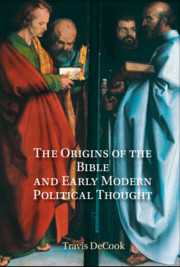 The Origins of the Bible and Early Modern Political Thought
The Origins of the Bible and Early Modern Political Thought Book contents
- The Origins of the Bible and Early Modern Political Thought
- The Origins of the Bible and Early Modern Political Thought
- Copyright page
- Dedication
- Contents
- Acknowledgments
- Introduction
- 1 The Primordial Bible
- 2 The Extrinsic Bible
- 3 Scripture Atomized
- 4 The Trial of Scripture
- 5 The Religion of the State
- Conclusion
- Bibliography
- Index
1 - The Primordial Bible
William Tyndale’s Social Vision and the Limits of Disenchantment
Published online by Cambridge University Press: 02 March 2021
- The Origins of the Bible and Early Modern Political Thought
- The Origins of the Bible and Early Modern Political Thought
- Copyright page
- Dedication
- Contents
- Acknowledgments
- Introduction
- 1 The Primordial Bible
- 2 The Extrinsic Bible
- 3 Scripture Atomized
- 4 The Trial of Scripture
- 5 The Religion of the State
- Conclusion
- Bibliography
- Index
Summary
This chapter explores how the reformer William Tyndale prompts a rethinking of arguments about Protestant biblicism’s capacity for disenchantment. It analyzes Tyndale’s exceptionally elevated portrayals of the Bible’s divine origin, which elide the shaping roles of materiality, history, and human action on the scriptural texts, and which he mobilizes in order to advance his argument about the primacy of Scripture over the institutional authority of the Roman Catholic Church. The chapter challenges the picture of Tyndale put forward by scholars in which he is seen to replace a communal mediation of the sacred with a nascent individualism. It does this by focusing on Tyndale’s representations of Bible reading as the means by which the Christian is caught up in a personal and affective relationship with God, a relationship which in turn transforms the human community. This chapter argues that Tyndale’s apparently disenchanting separation of Scripture’s origin from history is paradoxically the means by which he advances a vision of the human community’s participation in God. Tyndale’s account of Scripture thus disrupts the binary and unidirectional logic of disenchantment.
Keywords
- Type
- Chapter
- Information
- The Origins of the Bible and Early Modern Political ThoughtRevelation and the Boundaries of Scripture, pp. 36 - 64Publisher: Cambridge University PressPrint publication year: 2021


